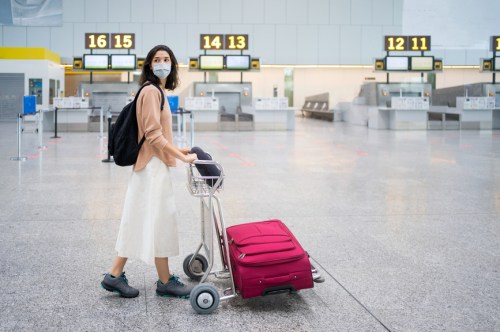Traveling to the U.S. Is About To Get Easier for Fully Vaccinated Foreign Visitors
The Biden administration just announced plans to lift the Covid-19 international air travel ban in November for vaccinated passengers.

In the hopes of curbing the spread of COVID-19 to the United States amid news of its eruption across Europe early last year, the previous administration launched several international travel bans; President Joe Biden has largely kept those restrictions in place since arriving in office. On Monday, however, his administration announced a plan to lift the COVID-19 air travel ban as soon as November, reopening the borders to foreign air travel for the first time in over a year and a half, according to the New York Times.
To be specific, the loosened restrictions will allow foreign travelers with proof of vaccination and a negative COVID-19 test result from within three days of their slated arrival in the U.S. to fly to the country without quarantining, White House pandemic coordinator Jeff Zients told the Times on Monday. Stricter rules apply to unvaccinated travelers, though, who will need to produce a negative COVID-19 test from within one day of travel, as well as proof that they’ve purchased another test to take upon landing in the States. (As a note, these changes do not effect U.S. land-border policies, which still restrict much cross-border travel from Mexico and Canada.)
According to Zients, the CDC will also require airlines to collect current information for each U.S.-bound traveler, including their phone number and email address, to aid with contact tracing, reports CNBC.
The distinction between the requirements for vaccinated and unvaccinated folks to enter the U.S. reflects the Biden administration’s continued goal of keeping the spread of the COVID-19 virus at bay, given what we know about the vaccine’s high efficacy at minimizing both risk of infection and transmission.
It’s possible that as booster shots become more widely available as a means to extend the immune-supportive effect of the vaccine, an additional shot may be required for international travel to the U.S., but as of now, proof of an original COVID-19 vaccination recognized by the CDC (along with a negative test result, as noted above) will suffice. Coupled with the fact that many insurance companies may soon stop covering health costs associated with contracting COVID-19, the extra ease of foreign travel is just another reason to get vaccinated, if you haven’t already.
Among broad-sweeping benefits like smoother global business operations and maintaining positive relations with foreign allies, Zients cited the uptick in the pace of vaccinations worldwide as a major impetus for the plan to lift the COVID-19 air travel ban.
Given the new wave of cases prompted by the highly contagious COVID-19 Delta variant this summer, the administration’s decision to open the border this fall reflects strong confidence, once again, in the efficacy of the vaccines to limit spread. (That said, future spikes related to new or existing variants could very well prompt the return of travel bans, as the Biden administration weighs the safety of U.S. citizens against the benefits of open borders.)
Why the lifting of a COVID-19 travel ban matters
Both economically and emotionally, the opening of U.S. borders to foreign air travel reflects a hopeful bright spot in the often dim COVID-19 outlook. Not only will the lifting of the ban boost both international business and leisure travel and speed the economic recovery of the hospitality and airline industries, but it will also grant many people the welcome opportunity to see their family members in person for the first time since before COVID-19 was even a pandemic—just in time for the holiday season.
And even for those who jumped through travel-restriction hoops last year to see loved ones in the flesh, the lifting of the ban this year presents a new opportunity for fully vaccinated families to share air-space and fully embrace each other without the lurking fear of contracting COVID-19 that put a wrench in so many in-person holiday celebrations last year.
“Finally our parents and our family can come see us,” Luca Marsura, a manager in New York from Treviso, Italy, told the Times. Though Marsuna traveled to Italy this past summer to see his loved ones, he had to spend two weeks in Aruba on the way back in order to be permitted into the United States—an expensive and thus inaccessible route for many people in a similar position. At the news of the soon-to-be-lifted ban, Marsura said, “You have no idea how happy we are.”
Oh hi! You look like someone who loves free workouts, discounts for cutting-edge wellness brands, and exclusive Well+Good content. Sign up for Well+, our online community of wellness insiders, and unlock your rewards instantly.
Sign Up for Our Daily Newsletter
Get all the latest in wellness, trends, food, fitness, beauty, and more delivered right to your inbox.
Got it, you've been added to our email list.








